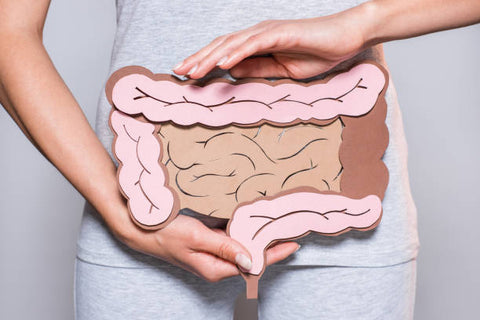Intestinal permeability
Our gut, often overlooked, plays a crucial role in our overall health. Intestinal leakiness, also known as “leaky gut” or “hyperpermeability,” can lead to a variety of health problems. In this blog, we will explore what intestinal permeability is, including the intestinal lining, its causes, and how to prevent it naturally.In France, it is estimated that 6.7 million people are affected by Irritable Bowel Syndrome.
What is intestinal permeability?
Leaky gut, or leaky gut, occurs when the intestinal wall becomes more permeable than normal. This allows unwanted substances, such as toxins and bacteria, to pass through the intestinal wall and enter the bloodstream. This can trigger inflammatory reactions and contribute to various health problems, including autoimmune disorders.
How does intestinal permeability manifest?
Intestinal permeability, often called “leaky gut,” manifests itself with a set of symptoms that can vary from person to person. While these symptoms may be indicative of other health issues, they may also be related to intestinal permeability. Here are some common signs:- Digestive Problems:
- Bloating: A feeling of abdominal bloating may indicate intestinal permeability due to gas buildup.
- Gas and flatulence: Frequent release of gas can be a sign of imbalance in the digestive system.
- Gastrointestinal problems:
- Constipation or diarrhea: Frequent changes in stool consistency may be associated with intestinal permeability.
- Irritable bowel syndrome (IBS): Some symptoms of IBS, such as abdominal pain and changes in bowel habits, may be related to intestinal permeability.
- General Symptoms:
- Chronic fatigue: Inflammation caused by leaky gut can contribute to persistent fatigue.
- Joint and muscle pain: Systemic inflammation can lead to joint and muscle pain.
- Skin problems: Skin conditions like eczema can be linked to intestinal problems.
- Food Reactions:
- Food intolerances: Intestinal permeability can lead to exaggerated reactions to foods, causing symptoms such as headaches or digestive upset after eating certain foods.
- Immune Problems:
- Frequent infections: Intestinal permeability can weaken the immune system, making a person more susceptible to infections.
- Autoimmune responses: Autoimmune diseases can be triggered by leaky gut because the immune system can react poorly to particles passing through the intestinal wall.

What are the causes of intestinal permeability?
- Unbalanced diet: A diet high in sugars, processed foods and gluten can contribute to intestinal inflammation.
- Chronic stress: Prolonged stress can alter the balance of intestinal flora and compromise the integrity of the intestinal wall.
- Overuse of antibiotics: Antibiotics can disrupt the balance of beneficial gut bacteria, promoting leaky gut.
- Poor sleep quality: Insufficient or poor quality sleep can compromise gut health.
- Environmental Toxins: Exposure to environmental toxins, such as heavy metals, can contribute to intestinal leakiness.
How to treat intestinal permeability Naturally?
Eat a Healthy Diet: Eat a diet rich in whole, unprocessed foods, fiber, probiotics and omega-3 fatty acids to support gut health.
Manage Stress: Practice stress management techniques, such as meditation, yoga, or deep breathing.
Use specific food supplements: Certain supplements, such as L-glutamine , specific complexes such as Perméa vital from Vit'all+ or probiotic permeability from Dietaroma can help you in your intestinal recovery process, full-spectrum probiotics and acids Omega-3 fats, like Krill Oil , can help restore gut health over the long term.
In the short term to stop bloating and gas you can use activated vegetable charcoal or specific complexes such as Nivel flatu .
Avoid Toxins: Reduce your exposure to toxic substances by choosing natural cleaning products and limiting the use of plastics or various sources of pollution.
Improve your quality of sleep: Establish a regular sleep routine and create an environment conducive to rest.

To conclude:
Intestinal permeability can have a significant impact on health, but lifestyle changes and a natural approach can help restore balance. Always consult a health or wellness professional for an accurate diagnosis and personalized advice. Taking care of your gut means taking care of your overall well-being.
All products concerning the intestinal sphere!
Studies and references:
Foitzik T, Kruschewski M, Kroesen AJ, Hotz HG, Eibl G, Buhr HJ.Does glutamine reduce bacterial translocation? A study in two animal models with impaired gut barriers. Int J Colorectal Dis 1999;
14(3):143-149
Desreumaux P, Colombel JF. Intestinal flora and chronic inflammatory bowel diseases. Gastroenterol Clin Biol 2001; 25(Spec
No. 2):C89-C93.19
Beutheu S, Ouelaa W, Guerin C et al. Glutamine supplementation, but not combined glutamine and arginine supplementation, improves gut barrier function during chemotherapy-induced intestinal mucositis in rats. Clin Nutr 2014; 33(4):694-701.
AFSSA. Effects of prebiotics and probiotics on the flora and immunity of adult humans. 2005.
Riva A, Ronchi M, Petrangolini G, Bosisio S, Allegrini P. Improved Oral Absorption of Quercetin from Quercetin Phytosome®, a New Delivery System Based on Food Grade Lecithin. Eur J Drug Metab Pharmacokinet. 2019 Apr;44(2):169-177.
Wegmüller R, Tay F, Zeder C, Brnic M, Hurrell RF. Zinc absorption by young adults from supplemental zinc citrate is comparable with that from zinc gluconate and higher than from zinc oxide. J Nutr. 2014 Feb;144(2):132-6.




Comments (0)
There are no comments for this article. Be the first one to leave a message!